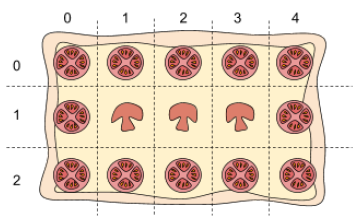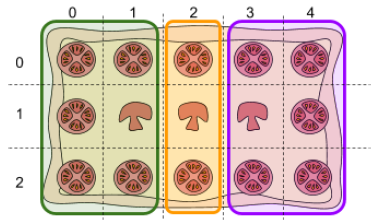This challenge is a practice problem for Google Hash Code 2017.
##Introduction
Did you know that at any given time, someone is cutting pizza somewhere around the world? The decision about how to cut the
pizza sometimes is easy, but sometimes it’s really hard: you want just
the right amount of tomatoes and mushrooms on each slice. If only
there was a way to solve this problem using technology…
##Problem description
###Pizza
The pizza is represented as a rectangular, 2-dimensional grid of R rows and C columns. The cells within the grid are referenced using a pair of 0-based coordinates [r, c], denoting respectively the row and the column of the cell.
Each cell of the pizza contains either:
- mushroom, represented in the input file as
M; or
- tomato, represented in the input file as
T
###Slice
A slice of pizza is a rectangular section of the pizza delimited by two rows and two columns, without holes. The slices we
want to cut out must contain at least L cells of each ingredient
(that is, at least L cells of mushroom and at least L cells of
tomato) and at most H cells of any kind in total – surprising as it
is, there is such a thing as too much pizza in one slice.
The slices being cut out cannot overlap. The slices being cut do not
need to cover the entire pizza.
###Goal
The goal is to cut correct slices out of the pizza maximizing the total number of cells in all slices.
##Input data set
The input data is provided as a data set file – a plain text file containing exclusively ASCII characters with lines
terminated with a single \n character at the end of each line (UNIX-
style line endings).
###File format
The file consists of:
##Example Input File
3 5 1 6
TTTTT
TMMMT
TTTTT
3 rows, 5 columns, min 1 ingredient per slice, max 6 cells per slice

###File format
The file must consist of:
- one line containing a single natural number
S (0 ≤ S ≤ R × C) , representing the total number of slices to be cut,
U lines describing the slices. Each of these lines must contain the following natural numbers separated by single spaces:
r1, c1, r2, c2 (0 ≤ r1, r2 < R, 0 ≤ c1, c2 < C) describe a slice of pizza delimited by the rows r1 and r2 and the
columns c1 and c2 , including the cells of the delimiting rows and
columns. The rows ( r1 and r2 ) can be given in any order. The
columns ( c1 and c2 ) can be given in any order too.
###Example
3
0 0 2 1
0 2 2 2
0 3 2 4
###Example description
3 slices.
First slice between rows (0,2) and columns (0,1).
Second slice between rows (0,2) and columns (2,2).
Third slice between rows (0,2) and columns (3,4).

###Validation
For the solution to be accepted:
- the format of the file must match the description above,
- each cell of the pizza must be included in at most one slice,
- each slice must contain at least
L cells of mushroom,
- each slice must contain at least
L cells of tomato,
- total area of each slice must be at most
H
###Scoring
The submission gets a score equal to the total number of cells in all
slices.
Note that there are multiple data sets representing separate instances
of the problem. The final score is the sum of your best scores on the
individual data sets.
###Scoring example
The example submission file given above cuts the slices of 6, 3
and 6 cells, earning 6 + 3 + 6 = 15 points.